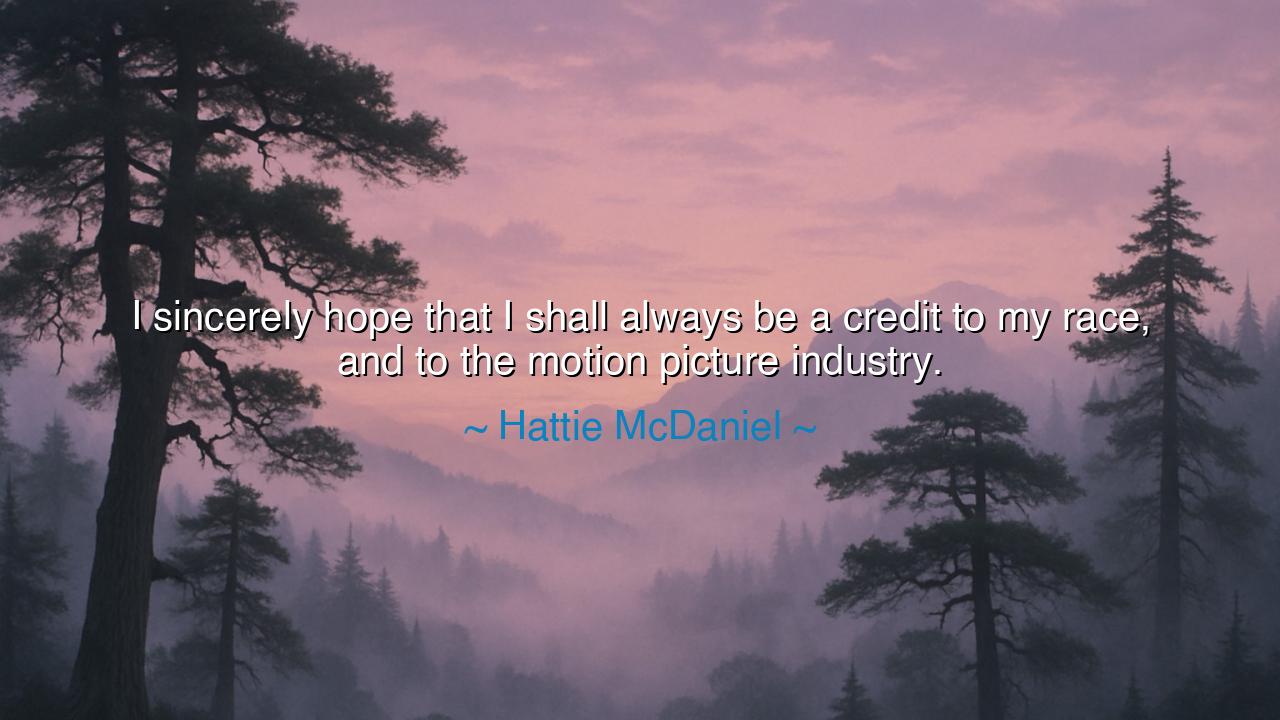
I sincerely hope that I shall always be a credit to my race, and
I sincerely hope that I shall always be a credit to my race, and to the motion picture industry.






In the hush of a gilded hall where applause rolled like distant surf, Hattie McDaniel spoke with the gravity of a torchbearer: “I sincerely hope that I shall always be a credit to my race, and to the motion picture industry.” Hear how each word is placed like a stone in a foundation. I sincerely hope—not boasting, but pledging. Always be a credit—not merely to herself, but to a people and a craft. My race and the motion picture industry are named together, joined without shame or apology, as if to say: dignity and excellence must walk the same road. This was no ornament to victory; it was a covenant spoken under lights that once refused to shine on her.
The meaning is double and indivisible. First, she binds personal excellence to collective honor: the artist’s triumph is not a private feast, but bread to be shared. Second, she refuses the cruel choice the age often demanded—be a “credit” to your race or to your industry—and declares both, insisting that excellence for one must elevate the other. In the elder tongue: she set her lamp on two altars, and made of her craft an offering to both community and cinema.
Consider the origin. On the night of February 29, 1940 (the 12th Academy Awards), McDaniel became the first Black Oscar winner, honored as Best Supporting Actress for Gone with the Wind. She delivered her brief, trembling remarks before a segregated audience—seated apart, admitted only after a special exception at a venue that barred Black patrons. In scarcely a minute, she thanked her peers and uttered the vow that time has not exhausted: to be a credit to her race and to the motion picture industry. The line survives in official transcripts and retrospectives of that night.
The room, the rules, the risk—these deepen the sentence. To promise “always” while history says “not yet” is an act of brave imagination. Her words were not a curtain line; they were a bridge. They carried her across the insult of segregated seating and into the fellowship of working artists, and they carried others after her—young actors and craftsmen hearing, perhaps for the first time, that greatness could serve both ancestry and art without betrayal.
A humbler story makes the point plain. Years after that night, a small-town drama teacher posted the quote above a stage door. She told her students, “Whatever your people are—your family, your village, your city—let your work be a credit to them. And let it also be a credit to the stage.” One graduate became a lighting designer. He learned to know the crew by name, to leave every house better than he found it, to guard the dignity of extras and understudies. When asked why he worked this way, he tapped the plaque: “Two promises, one life.” The world did not thunder for him, but rooms were kinder because he entered them. Such is the quiet geometry of McDaniel’s vow.
Her words also carry a sorrow and a steel. They acknowledge the burden placed on the first through the door: to represent “my race” under the scowl of stereotype, and to represent “the industry” under the gaze of those who doubted she belonged. Yet the vow transforms burden into purpose. To be a credit is to lift standards, widen opportunity, and refuse the smallness of cynicism. It is to answer slander not with silence but with mastery—craft so precise that even enemies must reckon with it.
What, then, is the lesson we should carry? First, bind your excellence to something larger than yourself. Ask, with each role, script, or shift: Will this be a credit to those who raised me, and to the craft I practice? Second, translate honor into habits: learn names on the call sheet; share credit publicly; protect those with least power on the set. Third, preserve the story: mentor the next in line, so that representation grows from token to tapestry. Fourth, keep the records straight—support institutions that remember pioneers rightly, as when McDaniel’s long-missing Oscar was replaced and returned to Howard University, honoring both the artist and the lineage she served.
Carry the cadence like a pilgrim’s rule: sincerely, hope, always, credit, race, motion picture industry. Let it make you brave when rooms are cold, and humble when rooms are warm. For the ancient wisdom is this: a life becomes great when its victories feed more than its appetite. So may we labor as Hattie did—hands steady, heart open—until our work is a light for our people and a standard for our profession, and those who come after can say: they kept faith with both.






AAdministratorAdministrator
Welcome, honored guests. Please leave a comment, we will respond soon